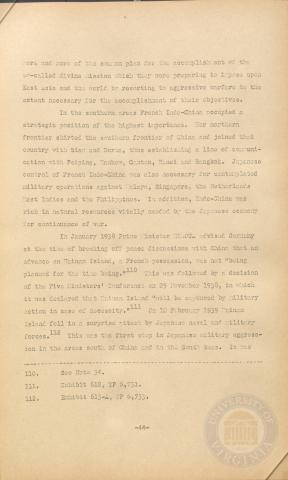
Page 44
| Parent | Japanese - German - Italian Collaboration |
|---|---|
| Date | |
| Language | English |
| Collection | Tavenner Papers & IMTFE Official Records |
| Box | Box 14 |
| Folder | Japan, Germany, Italy Collaboration and Introduction |
| Repository | University of Virginia Law Library |
no re and more of the com ion plan for the accomplishment of the
so-called divine nission which thov wore preparing to impose upon
East Asia and the world by resorting to aggressive warfare to the
extent necessary for the accomplishment of their objectives.
In the southern areas French Indo-China occupied a
strategic position of the highest importance. Her northern
frontier skirted the southern frontier of China and joined that
country with Sian and Buri'ia, thus establishing a line of comr.uni-
cation with Pelping, Hankow, Canton, Hanoi and Bangkok. Japanese
control of French Indo-China was also necessary for contemplated
military operations against J la lay a, Singapore, the Netherlands-
3ast Indies and the Philippines. In addition, Indo-China was
rich in natural resources vitally needed by the Japanese economy
for continuance of war.
In January 1938 Prime Minister IiiliOTA advised Germany
at the time of breaking off peace discussions with China that an
advance on Hainan Island, a French possession, was not 51 being
planned for the time being.” 110 This was followed by a decision
of the Five Ministers' Conference on 25 November 1938, in which
it was declared that Hainan Island "will be captured by military
action in case of necessity.” 111 On 10 February 1939 Hainan
Island fell in a surprise attack by Japanese naval and military
forces. 112 This was the first step in Japanese military aggress¬ion in the areas south of China and in the South Seas. It was
110.See Note 34.
111.Exhibit 612, TP 6,731.
112.Exhibit 613-A, TP 6,733.
